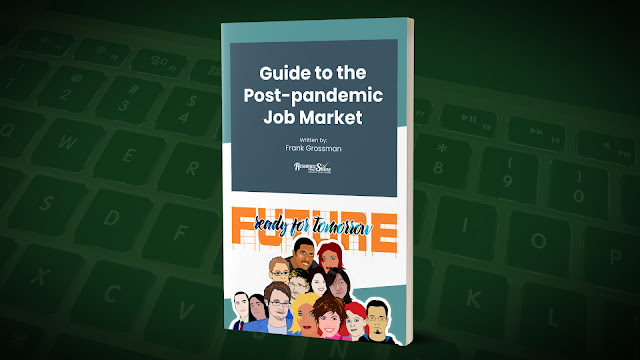The world is in a “demographic, healthcare, and technological revolution” writes Frank Grossman — founder of Resumes That Shine — in “Guide to the Post-Pandemic Job Market,” his new e-book about today's job search process.
Those societal shifts — combined with challenges brought on by the global COVID-19 pandemic — mean that jobseekers will have to be more nimble in the the future.
“Whether you are in school now or are in mid-career and plan to work another 10, 15, or 20 years, your skills could be obsolete if you don’t respond to change,” writes Grossman. The average jobseeker’s skills will have to be stronger than ever to earn a living wage — even for jobs that previously didn’t require college degrees.
While Grossman says his guide isn’t “crystal-ball gazing,” it provides research on the hurdles applicants face in today’s job market, jobs that are on the “endangered species list,” the evolution of the job search, the virtues of enhancing career skills (both hard and soft), and new paradigms and opportunities in the job market.
One of the more fascinating aspects of the “Guide to the Post-Pandemic Job Market” is Grossman’s focus on growth areas in the job market over the next decade (an aspect that is sometimes overlooked in today's social media zeitgeist).
Various media outlets have recently focused on the rise of remote work (with some companies making a permanent paradigm shift) as well as the trend of workers leaving the workforce in what's been dubbed the Great Resignation.
The Society for Human Resource Management (SHRM) recently shared a study (during the organization's 2022 annual conference) that reports 48 percent of survey respondents are “definitely” looking to work remotely.
But according to statistics from the U.S. Department of Labor (DOL) presented in Grossman's guide, the top 20 job categories between now and 2030 — with salaries ranging from $23,680 to $110,140 — are primarily in-person professions (“high-touch” jobs where one must be physically present to do the work are at — or near — the top of the list).
The dichotomy between professions that will be “in demand” and those that are “desired” creates an interesting conundrum for jobseekers and career services professionals going forward.
Jobseekers need to be practical.
“It would be nice to look at the menu of jobs in demand for the post-pandemic 2020s and pick one that meets your criteria for a great opportunity,” writes Grossman. “This will not work for many of us because we must fit the job to be successful.”
Since starting Resumes That Shine in 2004, Grossman has worked with a wide-ranging client base — tailoring resumes, cover letters, LinkedIn profiles, and job search strategies. He is a Certified Career Management Coach (CCMC) and a Nationally Certified Online Profile Expert (NCOPE). During the early stages of his business, Grossman served as a Work Readiness Trainer with the ResCare welfare-to-work program in Brooklyn, NY — writing, editing, and/or critiquing roughly 1,200 resumes in that role.
Sprinkled with raw data and personal and professional anecdotes, Grossman’s “Guide to the Post-Pandemic Job Market” provides salient information and analysis for resume writers, career coaches, and jobseekers as they navigate the job search process.












